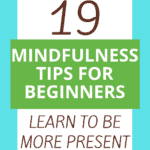THIS POST MAY CONTAIN AFFILIATE LINKS. PLEASE SEE MY DISCLOSURES FOR MORE INFORMATION
Are you tired of always being caught up in the chaos of your life?
Do you want to be able to take time to rest and to appreciate the moment that you are in?
Too many of us are stuck in this loop where we are constantly thinking about the past or worrying about the future that we miss the beauty that is now.
The good news is you can start to enjoy this moment more, and you do this through mindfulness.
Mindfulness isn’t some hokey idea that is nonsense.
It actually works and there are many benefits of mindfulness aside from being more present in your daily life.
In this article, I’ll share with you the best mindfulness tips for beginners to help you start using mindfulness in your everyday life.
19 Actionable Mindfulness Tips For Beginners
What Is Mindfulness?
If you aren’t familiar with the entire concept of mindfulness, it’s a state of mind where you’re more self-aware in the present moment.
It’s acknowledging and accepting your feelings and thoughts in that given moment.
You often hear mindfulness paired with meditation as a breathing practice.
It incorporates the concepts of mindfulness, which is learning to accept your thoughts for what they are and letting them go.
Mindfulness is not just a habit, but it’s more of a lifestyle.
To help you get started on your journey, here are the best tips for beginners!
#1. Separate Your Identity From Your Self Worth
Whether you plan on using mindfulness along with meditation or individually, you have to recognize that you’re not your thoughts.
Even your darkness and most negative thoughts are not a reflection of who you are.
It’s incredibly easy to dwell in the negativity of life which is why your thoughts may be comprised of that negativity.
But to practice mindfulness in your life, you need to separate your identity from your thoughts.
Simply sit your thoughts and observe them without judgment.
Only by having that kind of self awareness can you let your thoughts go.
#2. Make Mindfulness A Priority
When incorporating mindfulness into your daily life, you should make it a priority and find ways to practice mindfulness such as meditation.
Mindfulness is more challenging than it sounds, especially as we live in a very distracted world where we find it hard to sit still in our thoughts without dwelling in them.
By completing even a daily meditation practice, you can make mindfulness a priority and without realizing it, you’re incorporating it into your way of life.
#3. Practice Patience
Realize that the remarkable benefits that mindfulness can provide in your life doesn’t happen overnight.
Mindfulness affects people differently where some find it easy to apply and others struggle with mindfulness.
You need to be patient, both with yourself and mindfulness as a whole.
Mindfulness requires you to look within, which isn’t easy for some as it can require vulnerability and honesty on your end.
#4. Enjoy Mindfulness
Some individuals are so focused on the benefits of mindfulness that they forget to have fun with it.
Don’t get so hung up on doing it perfectly or on its effectivity that you forget to enjoy the practice altogether.
You won’t find all days easy, but you won’t find all days hard as well.
When sitting with your thoughts, take a moment to appreciate this practice that’s helping you develop clarity and presence in your thoughts.
#5. Notice When You’re Spacing Out
There are so many times in your day when it’s easy to zone out, whether we’re in work or even when scrolling through our phones.
- Read now: Learn the many benefits of day dreaming
Mindfulness is all about being in the present moment.
So when you find you’re zoning out, let yourself go back to being present and acknowledge whatever is going on both in your mind and body.
The same goes for mindfulness meditation practices.
Always come back to being present when you’re zoning out in your mind.
#6. Keep A Daily Journal
Journaling is great for keeping both your emotions and thoughts in check.
Most importantly, it helps you become grounded with living in the present moment.
Whenever you write your thoughts down, you’re being self aware with everything you feel.
It also allows you to get thoughts out of your brain so you can focus more of your energy on being present.
- Read now: Click here to learn how to focus
It’s a great way to practice mindfulness every day, even through a simple writing practice like journaling.
Write down precise details of your life as if you’re observing it, and write down those details on your journal.
#7. Practice Having Relaxed Attention
When dealing with specific negative emotions such as anxiety, boredom, grief, or stress, it’s easy to dwell on these because we give it our focused attention.
By practicing relaxed attention as if you’re watching an outsider of your environment, it gives you more control over your emotions rather than the other way around.
This kind of approach towards mindfulness can help you have a calmer approach to your negative emotions and diffuse them entirely.
#8. Practice Mindful Listening
As mentioned earlier, we live in a very distracted world so it’s difficult to be a good listener while practicing mindfulness.
There’s a thin line that separates communication and listening, so by practicing mindful listening, this not only benefits mindfulness but all your friendships and relationships as well.
Mindfulness doesn’t just benefit your self improvement journey but this goes even with your deepest connections.
The more undivided attention you can give to your loved ones, the deeper your connection becomes.
#9. Be Present More
This is easier said than done given our tendency to use distractions to escape the current reality of daily life.
We try so hard to run from the present, but we tend to dwell on the past or future.
If you want to practice mindfulness, you need practice being present more in your life.
Otherwise, it’s easy to miss a moment until you realize that moment has already passed.
#10. Exercise
Even as exercise can act as a distraction from everything we’re doing, it can also help us practice proper self awareness and mindfulness.
When doing exercise, practice setting the right intentions such as weight loss or running 5 kilometers.
It also helps to slow down and take into account everything you’re doing, including your breathing, the way your body feels, and your surroundings.
This helps you become more present even with an intense activity like exercise.
Add on the many health benefits it has on your physical and mental health, and exercise is one of the best habits you can incorporate into your daily life.
#11. Slow Down
In a world that romanticizes the busy life, you need to practice slowing down if you want to incorporate mindfulness in your life.
Not everything in life is meant to be rushed.
Instead of always looking forward to the next deadline, next goal, or next relationship, slow down and appreciate that pace in your life.
This is also how you become more present instead of always anticipating the next thing.
Even slowing down for 10 minutes in your busy schedule can do wonders for your life.
For me, I like to take a walk first thing in the morning.
It’s quiet and there are very little distractions.
As a result, I can focus on my breath and enjoy the little things life has to offer.
And by doing it first thing in the morning, it puts me in the right mind set for the rest of the day.
#12. Find A Quiet Place
When doing mindfulness practices, meditation, or if you just want that break from everything, finding a quiet place is crucial.
This is where you can peacefully sit in your thoughts without any interruptions or distractions.
This is the place where you can practice calming down your busy mind without the fear of being judged or criticized for your actions.
You can also practice your meditations here as well, without the worry of being interrupted.
#13. Take Advantage Of Guided Meditations
There are two forms of meditations, which are guided and unguided meditations.
It can be overwhelming for beginners to begin meditation as you don’t where to begin or how to get through the entire routine.
With a guided meditation, you’ll be guided through the entire time so you don’t have to worry about what you’re supposed to do.
Guided meditations also come in different forms such as podcasts and videos.
#14. Pick Simple Objects
When you practice mindful meditation where you sit with your thoughts and allow your mind to wander, it’s important to choose an object of focus.
It should be an easy object rather than a complicated one to make your meditation routine easier.
Normally, the object of focus in meditation for beginners is your breathing so focus on the rhythm of your breaths whenever you sit with your thoughts.
As you gain better understanding on how mindful meditation works, this is where you can start doing mindful walking or eating.
#15. Treat Mindfulness As An Experience
Instead of viewing mindfulness as an obligation or something you’re forced to do, treat it as an experience to connect with yourself better and understand the reasons behind your thoughts.
The mind is a very powerful tool you have and mindfulness practices are opportunities to understand your mind better.
Only by understanding and accepting your thoughts can you effectively deal with and let go of even your darkest thoughts.
#16. Stop Making Excuses
In relation to prioritizing mindfulness concentration, you can’t keep saying you don’t have the time to practice it or that it’s not for everyone.
Instead of making excuses, start trying to incorporate mindfulness in your life.
The more you can’t sit still even for just a few minutes in your day, the more you need mindfulness in your life.
You can start mindfulness anytime so when you’re ready to stop making excuses, a mindful life is just around the corner.
#17. Stop Worrying Whether You’re Doing It Right
As long as you’re practicing mindfulness in simple ways each day, you don’t have to worry about getting it right or wrong.
Practice makes perfect and as long as you’re doing your best in these mindfulness practices like meditation, you’re doing the right thing.
The time you spend worrying is time you can spend being mindful instead.
#18. Consider Doing Yoga
Yoga is one of the great relaxation techniques you can do to calm your mind and body and wipe away stress.
Many times people will dismiss yoga as being too out there for them.
But there are many forms of yoga and I highly recommend you give it a try.
Doing the poses along with deep breaths allows you to fully release anything you are holding onto.
As with many of the other ideas listed here, you won’t be a great yoga start from the start.
But if you have patience and practice, you will quickly become better.
#19. Use Mindfulness Apps
If you are on the techie side, there are smartphone apps out there that will help you complete a mediation session.
Not only will these apps help you with calming your mind down, but they will also help you to pay attention to your body language.
This can have a big impact on what you get out of session.
Some of the best smartphone apps for beginner mindfulness include the following:
- Insight Timer
- Smiling Mind
- Stop, Breathe, and Think
- 10% Happier
- Calm
- Headspace
The idea of using an app is that it can be a motivating factor for some people to be intentional with their practice.
Final Thoughts
There are 19 mindfulness tips for beginners to help you be present and as a result, lead to greater happiness.
By completing a regular meditation practice that has you focus on your senses, you will become a better person.
Not only will you live a happier and content life, but you’ll regain more control.
Mindfulness encourages you to appreciate living in the present moment before it passes away completely.

Jon Dulin is the passionate leader of Unfinished Success, a personal development website that inspires people to take control of their own lives and reach their full potential. His commitment to helping others achieve greatness shines through in everything he does. He’s an unstoppable force with lots of wisdom, creativity, and enthusiasm – all focused on helping others build a better future. Jon enjoys writing articles about productivity, goal setting, self-development, and mindset. He also uses quotes and affirmations to help motivate and inspire himself. You can learn more about him on his About page.






